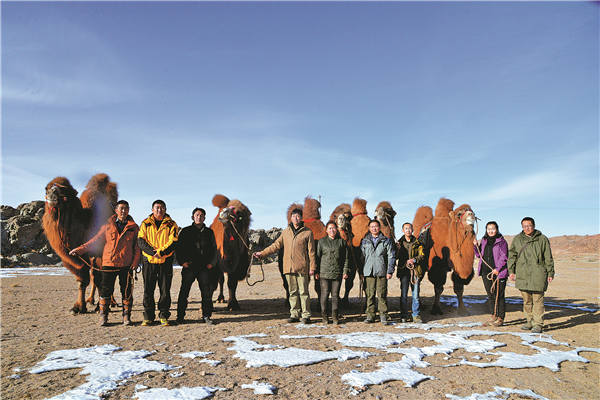

Inner Mongolia team patrols sites in Alshaa desert to guard cultural relics
Liu Bayar has developed a habit of traveling each month from his village in Alshaa Left Banner in the Inner Mongolia autonomous region to visit cultural sites in the desert.
He goes by camel in summer and by car, sometimes with his family, in winter.
A trip usually lasts two to three days. Whether the temperature drops to -20 C or spring sandstorms rage ferociously, Liu's plans don't change.
His trips are not for fun. Liu patrols the area to help safeguard the cultural heritage of his hometown, a mission he undertook when he joined 43 other volunteers for the duty in 2015.
Located in the western part of Inner Mongolia, Alshaa is spread across 80,000 square kilometers and has a population of 150,000. Though sparsely populated, the area has a rich cultural heritage, including ancient tombs, structures, temples and rock art sites.
There are more than 180 beacon towers from the Han Dynasty (206 BC-AD 220), 34 beacon towers from the Ming Dynasty (1368-1644), 3,578 meters of ancient city walls and more than 40 kilometers of the Great Wall.
"To meet the requirements of cultural heritage protection work and the reality that sites are scattered across mountains and remote deserts, we need help from volunteers," said Li Xiaowei, an official with the cultural heritage administration in Alshaa.
In 2015, the team of 44 volunteers, mainly consisting of local herdsmen and farmers from 8 sumu-or "villages" in Mongolian-was formed. It is known as the Tuofeng Cultural Heritage Protection Team.
Based on where they live, the volunteers are divided into eight groups and assigned to patrol different sites and areas. Coats, spotlights, climbing boots, backpacks and supplies are provided. "We also conducted training and gave them lessons on cultural heritage protection," Li said.
The volunteers are now being paid for their efforts.
"The work we did was unpaid at the beginning, but I started to receive compensation last year, earning about 10,000 yuan ($1,500) for the year," Liu said.